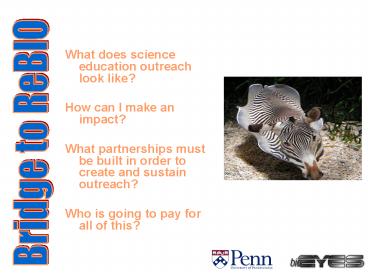What does science education outreach look like - PowerPoint PPT Presentation
1 / 13
Title:
What does science education outreach look like
Description:
Who is going to pay for all of this? Bridge to ReBIO. Bridging ScientistS at Every Level ... Help college students become familiar with regenerative biology concepts ... – PowerPoint PPT presentation
Number of Views:20
Avg rating:3.0/5.0
Title: What does science education outreach look like
1
- What does science education outreach look like?
- How can I make an impact?
- What partnerships must be built in order to
create and sustain outreach? - Who is going to pay for all of this?
2
Bridging ScientistS at Every Level
Jamie Shuda, EdD Thomas Jefferson
University Science Outreach Program
3
Project BioEYES
Breakdown the stereotypes of who can be
scientists Empower teachers to use innovative
science in their classrooms
Dr. Steven Farber
University of Notre Dame Johns Hopkins
University School District of Philadelphia Camden
City School District Baltimore City Public
Schools South Bend Indiana School System
4
Live Science In Classrooms Nationwide
- Bring zebrafish, microscopes, and scientific
inquiry into classrooms - Weeklong experiments with 3 days of co-teaching
- Standards-driven, cross curricula activities that
demonstrate students understanding of content
5
Expanding our Impact
Internship Programs
- Student-Driven Project
- Mentor Model with Training
- Culminating Presentation
6
Project BioEYES
- Program Website www.jefferson.edu/bioeyes
- New York Times, July 28, 2008
- To Teach Genetics, Zebra Fish Go to School
- http//www.nytimes.com/2008/07/29/science/29conv.h
tml - The Scientist, February 2007
- Making Outreach Work
7
ReBIO
- ReBIO is a formal partnership between the IRM and
Project BIOEYES - 4 year initiative to link local high school and
college level students - Provide focused research projects related to
regenerative biology
8
Primary Goals
- to provide both high school and college students
with extensive practice on building and
implementing sound research - to expose students to a college mentor who will
share their experiences and intentionally be a
resource for them and - to involve college students in teaching
opportunities in underserved communities.
9
ReBIO in Action
- Build research teams made up of experienced high
school science teachers, undergraduate mentors
from Penn, TJU, Lincoln, and Haverford, and
Philadelphia high school students - Each team will create a school-based research
project focused on regenerative biology that can
be entered in local, state, and national science
competitions
10
(No Transcript)
11
How can I make an impact?
- Become a Mentor
- Help develop science fair curriculum
- Donate equipment for the classroom
- Be on the mentor and student group selection
committees
- Help college students become familiar with
regenerative biology concepts - Host a tour or present your laboratorys work
12
Attention all College Students Become a mentor
- Become a mentor to four high school students
- Gain experience in creating and implementing
research projects - Develop teaching skills
- Network with leaders in the Regenerative Medicine
research field - Earn a stipend
13
Contact us
- Jamie.shuda_at_mail.jci.tju.edu
- Dan Kessler, Outreach Coordinator
- kesslerd_at_mail.med.upenn.edu































